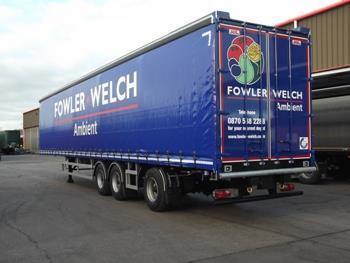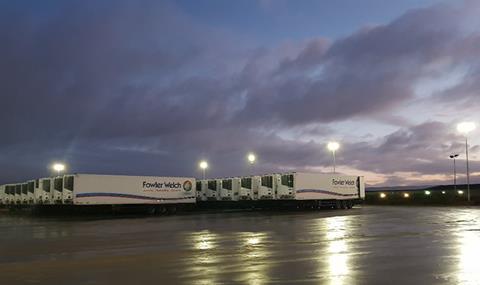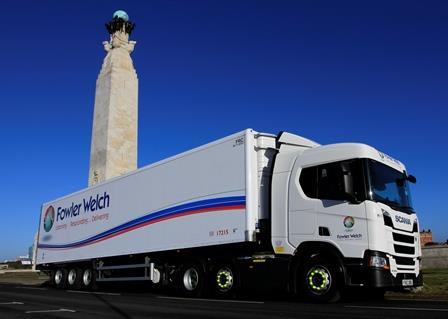Temperature controlled distribution specialist Fowler Welch (FW) has just completed a £2m upgrade of its largest site, in Spalding, Lincolnshire, after a year which saw turnover rise 13% to £163m in the 12 months to March 2017.
CEO Nick Hay says much of the money was spent upgrading the cold store and staff facilities rather than expanding the site.
“Spalding is an old site, so we've just taken the oldest part and stripped it out completely,” he says. “We have resealed the floor and put in around 40,000sq ft of new white wall cladding plus new racking, refrigeration plant and lighting. It is more energy efficient and a cracking environment for prospective customers.
“The other thing we've done is invest in a staff block with a pool table, table football and vending machines to create a nice area for people when they're on break. There are also new locker rooms and showers.”
The site has however benefited from an extension to the yard with parking for an additional 100 trailers. FW, since 1994 part of the listed Dart Group which also owns travel operator Jet2, acquired 10 acres of land adjacent to the Spalding site and with only half of this developed it has plenty of room for further expansion.
“This area is the biggest producer of food in the UK, so that's why we're there,” says Hay. “We certainly don't have a problem attracting new business through Spalding. It's in a fantastic location, especially for produce and protein which is what we do.
“There are also some big ready meal manufacturers in the area. Roughly a third of our business goes through Spalding. We could put another 80,000sq ft on quite comfortably.”
Pallet velocity
Unlike some other chilled operators, Hay does not measure the capacity of Spalding by the number of pallet storage spaces.
“If you ask our competitors they'll tell you how many pallets they can store,” he says “For me, it's much more about the throughput and the velocity as opposed to storage. It could hold 8,000 pallets and it does pick over a million cases a week but for me the important stat is that we handle 55,000 pallets a week.
“That is all at different temperatures, so some produce goes through at 8degC, some at 5degC and some at 3degC. That is why the majority of our fleet is multi-temperature, dual-evaporator trailers.”
While the temperature-controlled distribution remains the mainstay of the business, accounting for 80% of revenue, FW has been making inroads into the ambient food sector.

“We haven't grown it as much as we would like,” admits Hay. “It's a tough sector, with far more competition. We've had lots of opportunities in chill as well, and we believe in growing steadily and not over-stretching ourselves. All of our growth has been organic, which is again different from some of our competitors.
“It's about choosing which opportunities we back at any moment in time.”
One opportunity Hay has backed is a new fruit and vegetable packing joint venture based at FW’s 130,000sq ft chilled site in Teynham, Kent, called Integrated Service Solutions (ISS). “That'll turn over £25m this year,” says Hay. “They pack anything from cherries, strawberries and blueberries to kiwi and mangoes. That's been a real success for us and has enabled us to expand the transport operation because of the volume that goes through there.”
Dairy Crest
Two years ago, FW started on a 10-year partnership to run the Dairy Crest transport operation in Nuneaton.
“That added 50 tractor units and 110 staff and gave us a great location,” says Hay. “Yes, ambient is an opportunity but we've got lots of opportunities and it's just a case of not backing too many horses at once.
“The ambient business suffered as we lost one of our major clients when Tesco delisted them. It’s taken us a couple of years to recover from that, but we've started working with Vimto, which has replaced that volume. We're just putting a new roof on the warehouse in Heywood [FW’s 500,000sq ft ambient NDC near Manchester] at a cost of £2m.”
Despite the 14% hike in turnover last year, a rise in operating costs meant pre-tax profits fell 17% to £4.5m in the year to March 2017.
“The growth has been organic, on the back of the joint venture in Kent and the Dairy Crest operation,” says Hay. “But it's tough making an acceptable return when you look at the amount of investment. Our balance sheet's very strong. When I look at the balance sheet of our competitors, I'm horrified.
“We own the vast majority of our properties and we've strengthened the balance sheet over the last four or five years. The improvement in the fleet's been enormous. The mpg in the eight years that Paul [Allera, until recently FW head of fleet] and I have been here has gone from just over 8mpg to just over 10mpg.
“It’s always a challenge because you have all the cost increases - pensions, National Insurance etc - the list goes on and recovering those from customers, particularly in the food supply chain where you've got retailers who've been under the cosh, is incredibly difficult.
“It isn’t a huge surprise to me that the vast majority of our competitors are privately owned. There's a reason why they're not generally listed and that's because it's a tough market and it's volatile. You have to look at it long term, not the short term. If you want to build a new DC of any scale, it's a hell of a commitment and margins are tight.”

While FW’s achievements in improving fuel economy have been impressive, Hay is well aware that the best way to raise efficiency is to reduce empty running and increase vehicle utilisation, something he is equally aware are hard tricks to pull off in a market where volumes can vary quickly.
“We do have people focused on that,” he says. “But it can quite often be a Utopian view that does not reflect reality because of the customer base that we serve. They supply fresh food and produce where volumes are driven by whether the sun shining or Jamie Oliver's decided to promote a new type of vegetable. That volatility, and the time scale between people receiving the order and it needing to be delivered, is a real challenge.
“In the chill sector, there are staple products that we all go out and buy every single week, whether that is butter or yogurt or whatever, and they are pretty static. But there is other promotional activity that varies with the seasons.
“We distribute poinsettias for about two weeks at Christmas. We do most of the country's pumpkins and we do them for about two weeks. We do flowers for Valentine's Day, we do flowers for Mother's Day and we do strawberries – when Wimbledon is on we do a lot of strawberries.”
Collaboration
FW has had to reduce its reliance on subcontractors as their numbers have dwindled in recent years. Instead collaboration is the name of the game to cope with peaks of work. “There is a greater likelihood now we that collaborating with people who you'd see as a competitor,” says Hay. “As an industry, people are more pragmatic and less protective, and that's only a good thing.”
To improve the flexibility of its fleet, FW has worked with trailer maker Cartwright to develop a 26-pallet capacity self-unloading trailer that can also be loaded conventionally.
“We can only use the self-loading system in a facility that's got the ability to drag 26 pallets along,” says Hay. “The floor drops down over those tracks in the bottom of the trailer, so we can use it as a conventional trailer and run it in two directions.”
Driver challenge
Despite having its main base in Lincolnshire where there are fewer competitors for the UK’s dwindling driver population, FW is not immune from the shortage.
“There is undoubtedly an increasing challenge in terms of drivers,” says Hay. “I still strongly believe there are far more people driving for agencies now than at any other time, and that's because of the directive that removed some of the penalties of being an agency driver relative to an employed driver.
“That was the right thing to do but it's undermined the benefit of working for a Fowler Welch and the stability that comes with having full-time employment. So there's been a huge growth in the number of drivers who would rather work for an agency because they want the flexibility.
“We've got behind the Apprenticeship Levy pretty significantly. We have 26 driver apprentices now. We recognise the need to try and bring people in to the industry and we have used our levy specifically for drivers.
“It's not easy but it's worth doing and when we look at those who've gone through the apprentice scheme, the statistics for their driving style and accident damage are better on average than the rest of our drivers.”
Driver training and vehicle specs key to driving mpg gains
Fowler Welch has made significant improvements in the efficiency of its 500-strong fleet under the leadership of Paul Allera, who at the time of this interview was Fowler Welch head of fleet but has since moved to become technical director of the RHA.
While focusing on vehicle specs has been key, Allera says the bulk of the mpg gains have been through telematics and driver training over the past six years.
“We've made alterations to the vehicle specifications including drive train ratios, tyre sizes, pressures and compounds, aerodynamics etc,” he says. “It’s been lots of little incremental things but mainly it’s down to the development of the drivers.”
Unlike many operators who accepted the dire predictions that Euro-6 would be heavier, thirstier and more complicated and so bought as many Euro-5s as possible, Allera was an early adopter of Euro-6.
“Euro-6 was definitely a step forward,” he says. “People were telling us that we were foolish, but despite the scaremongering we embraced it and never looked back. We tried all the vehicles and yes, there was an increase in the capital costs, but everybody was telling us that the fuel efficiency wouldn't be as good - we saw it totally different.”

Despite running at 44 tonnes much of the time, FW is now averaging almost 10.5mpg. But Allera says: “You can always squeeze a little bit more.”
Even pulling fully-laden doubledecks, he argues that with the right aerodynamics, this sort of mileage is still possible.
“If it's driven correctly and the air kit on a tractor unit is set correctly, no matter how tall your trailer is, it will work,” he says. “Instead of having a fixed air deflector we have an adjustable air deflector so we can adjust it to the height of the trailer.”
Allera prefers to focus on the torque output of tractors rather than power, which he says currently has a “sweet spot” around 440hp to 460hp.
“The way that tractor units are evolving, there's less brake horsepower with the same amount of torque,” he argues. “That might give us that extra 0.2mpg or 0.5 mpg.”
The FW fleet has traditionally been mainly MAN and Volvo, but currently purchases are predominantly MAN and Scania. But the company is now repeating its thorough road trials of five manufacturers’ latest offerings.
“We have six Mercs, six DAFs, six MANs, six Volvos and six Scanias,” says Allera. “As far as dealers are concerned, Spalding is surrounded by every one of them. To make sure we get the proper comparisons we have put some in ambient and some in the chill divisions.”
Pusher 6x2
All FW’s tractors are 6x2s with a lifting pusher axle so it gets the benefit of a 4x2’s fuel and tyre economy when carrying lighter loads such as flowers.
“I would say the lifting axle is down probably 70% of the time,” Allera says. “Then there is also the RV angle.”
FW reckons that a three year old 6x2 is worth almost £7,000 more than an equivalent 4x2, more than making up for the 500kg weight penalty of a specifying the third axle on every vehicle.
Allera also points out that a lifting third axle gives better traction than a 6x2 with a fixed third axle. “They skid all over the place in the wet when it loses traction because you can't lift the middle axle,” he says.
Another consideration is the lower VED on a 6x2 over a 4x2 unit – a 44 tonne 3-axle unit coupled to a 3-axle trailer pays £1,200 road tax a year compared with £1,850 for a 38 tonne 2-axle tractor.
As a result, FW is not alone in preferring 6x2 tractors – of the 4,171 artics registered in the UK in Q1 2018, less than 10% were 2-axle.
At the time he quit FW in July 2018, Allera was not yet at the point of trying a gas-powered tractor unit, mainly because 6x2 400hp-plus models were only just coming to market and a national gas refuelling infrastructure was still not in place.
“It would probably work for certain operations but it would restrict our flexibility and planning,” he argues. “With the higher purchase cost, to get that money back it's going to be at least 24 to 30 months. If you're keeping vehicles for three years you've only got six months profit.”














